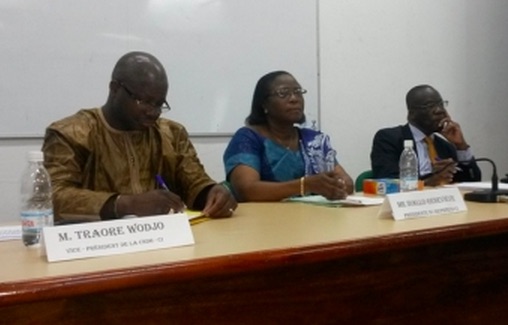. DEMOCRATIC PARTICIPATION .
An article from News Ivoire
The REPSFECO-CI, Peace and Security Network for Women of ECOWAS – Ivory Coast Section – wants to contribute to civic education and culture of peace. This organization initiated, Wednesday, August 5, 2015 in Abidjan, the first edition of the “Rendez-vous du REPSFECO-CI” under the theme “Peaceful elections: responsibilities of political parties and organizations of the civil society”.

The “Rendez-vous du REPSFECO-CI” is designed for organizations of civil society and political parties. Every actor involved in the democratic process should calmly prepare for future elections that guarantee stability and lasting peace, according to Mr. Diallo Géneviève, president of REPSFECO-CI. Côte d’Ivoire needs peace for its development. The upcoming elections are a test. The international community wants to see if our country really got into a democratic state. We think it is the political parties that determine the game. They have their supporters and activists. So it is important that political parties involved in these elections should speak in a different way because people are tired and they need to be reassured. We must not repeat the violent post-election crisis in 2010.
The highlight of “Rendezvous REPSFECO-CI” is a panel discussion moderated by M.Traoré Wodjo, vice president of the National Commission of Human Rights of Côte d’Ivoire (CNDH- CI) and Fernand-Julien Gauze, president of the NGO Action for Democracy, Justice and Freedom in Ivory Coast (ADJLCI) and member of the Network of organizations of civil society in Côte d’Ivoire (CCAP-Rosci ).
The communication of by M.Traoré Wodjo emphasized the responsibilities of political parties in promoting a peaceful electoral climate and effective participation in the electoral process. He noted that elections in Africa are often sources of serious social tensions. Witness the case of Côte d’Ivoire in 2010. That’s why the 2015 elections are a challenge to democracy for Ivorians. Hence the recommendation to the political parties to put a point of honor to the training and education of their supporters and especially to ask actions that promote a peaceful climate throughout the electoral process. “We want a civilized election in Ivory Coast,” he stressed. “Political parties that are conscientious and mature politicians with a high sense of democracy are the guarantee of a peaceful electoral process,” M.Traoré said.
Civil Society for peaceful elections was the theme of Fernand Julien Gauze, president of the ADJLCI, “Actions of CSOs in the objective monitoring of the electoral process and the consolidation of pre- and post-electoral peace” “Election monitoring” is an English expression which translates into French as “surveillance électorale” simply indicating the need to monitor the process of the election by civil organizations, citizens, political parties, media, trade associations, lobby groups etc. The purpose is to raise the alert. The expert in election monitoring has identified the crucial importance of monitoring in electoral processes in Côte d’Ivoire since it calls attention to the violence and incidents that may take place during an election. And, through informatics, the social networks and SMS. “The monitoring of violence is an essential civic activity in the electoral processes of countries that have experienced crises,” he concluded.
(Click here for the original version of this article in French.)
How should elections be organized in a true democracy?
CPNN receives more and more articles from Africa about initiatives that contest the European model of “winner-takes-all” elections, and demand that elections should only be part of a broader democratic process that seeks consensus and compromise.
This fits with the pre-colonial systems of justice in Africa, when there was no monotheism and no single supreme god, no single supreme law, no single “truth” provided by divine intervention, but rather a compromise among many different “gods,” perspectives and “truths” arrived at through a process of mediation, for example, the “palabra.”
Here are some of the articles:
Ghana Youth Coalition wants politicians to commit to peace in 2012
Women’s World in Nationwide Sensitization [Sierra Leone]
Varsities vouch for peace ahead of general elections (Kenya)
Zimbabwe: Christian denominations launch peace initiative
Rethinking Post-Election Peacebuilding in Africa
Nigeria: Why we facilitated Abuja peace accord —Ben Obi
Uganda: Government to Set Up Election Conflict Resolution Body
Côte d’Ivoire: Le REPSFECO-CI invite les acteurs à un processus électoral apaisé
Côte d’Ivoire: REPSFECO-CI promotes a peaceful electoral process